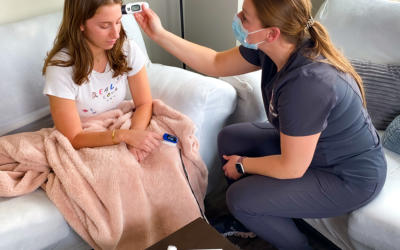Sore throat is a common complaint, especially during cold and flu season. Most sore throats are caused by viruses and go away on their own after a few days. Strep throat, however, is a bacterial infection and can become serious if left untreated.
What is strep throat?
Strep throat is an infection in the throat and/or tonsils caused by the bacterium Group A Streptococcus. Strep throat infections are most common in children but can affect patients of all ages.
What are the symptoms of strep throat?
Symptoms of strep throat include:
- Severe throat pain that comes on suddenly
- Difficulty swallowing
- Fever
- Swollen lymph nodes (in the neck)
- Red spots or white patches in the back of the throat
- Red and/or swollen tonsils
- Nausea and vomiting, especially in young children
When should you seek medical attention for a sore throat?
Reach out to a medical provider if you or your loved one experiences:
- Sore throat lasting more than 24 hours
- Fever
- Rash
- Difficulty swallowing or breathing (in either case, call 911 or go to the ER)
If left untreated, strep throat can lead to serious complications such as arthritis and damage to certain muscles, including your heart.
How is strep throat diagnosed?
Your provider takes a swab from the back of your throat to test for the presence of Group A Streptococcus. Taking the swab is not painful but can cause gagging. Depending on the type of testing used, results can be available between a few hours and a few days.
How is strep throat treated?
If you test positive for strep throat, you will be prescribed oral antibiotics to fight the infection. Penicillin and amoxicillin are the most common antibiotics used to fight strep. For those with an allergy to penicillin, other options such as azithromycin can be prescribed. Once you start taking the medication, you should start feeling better in 24-48 hours. As with all antibiotic treatments, it is very important that you take your medication, as prescribed, until it is all gone, even after you start feeling better. Stopping antibiotic treatment before the medication is gone can interfere with your recovery and increase the chance of more resilient strains of bacteria forming.
How can you care for strep throat at home?
In addition to taking your antibiotics as prescribed, take the following steps to feel better:
- Get plenty of rest
- Take over-the-counter pain medication, such as acetaminophen or ibuprofen to ease your symptoms
- Drink lots of fluids
- Gargle with warm salt water to soothe throat pain
- Avoid throat irritants such as cigarette smoke and chemical fumes
Contact Pivotal Health if You Suspect Strep Throat
Pivotal Health providers can come to you, on your schedule, and administer a rapid strep test with results in minutes. They will also assess your symptoms and can immediately prescribe antibiotics or other medications if needed. As with all Pivotal Health visits, we include follow-up care to make sure that your strep throat symptoms heal completely.
COMPARING YOUR SORE THROAT SYMPTOMS:
| SYMPTOMS OF STREP THROAT | SYMPTOMS OF VIRAL SORE THROAT |
| Abrupt sore throat | Cough |
| Pain with swallowing | Runny nose or congestion |
| Fever | Hoarseness |
| Red and swollen tonsils, sometimes with white patches | Conjunctivitis (pink eye) |
| Tiny red spots on roof of mouth | |
| Swollen lymph nodes on front of neck |












